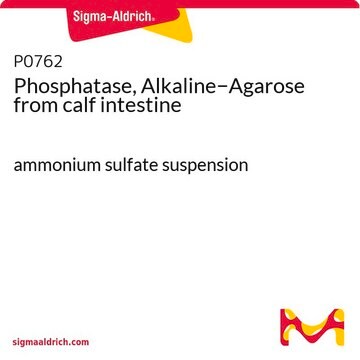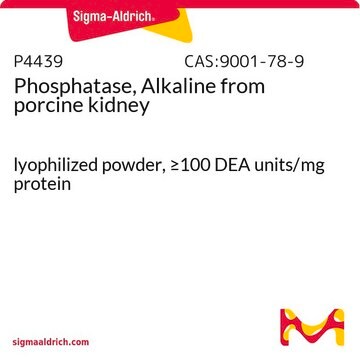P4069
Phosphatase, Alkaline from Escherichia coli
buffered aqueous glycerol solution, 20-50 units/mg protein (in glycine buffer)
Synonym(s):
Orthophosphoric-monoester phosphohydrolase (alkaline optimum)
Sign Into View Organizational & Contract Pricing
All Photos(1)
About This Item
Recommended Products
biological source
Escherichia coli
Quality Level
form
buffered aqueous glycerol solution
specific activity
20-50 units/mg protein (in glycine buffer)
foreign activity
DNase, RNase, none detected
storage temp.
−20°C
Looking for similar products? Visit Product Comparison Guide
Application
Alkaline phosphatase is used for conjugation to antibodies and other proteins for ELISA, Western blotting, and histochemical detection. It may be used for protein labeling when high sensitivity is required. Product P4069 is provided as a buffered aqueous glycerol solution.
Phosphatase, Alkaline from Escherichia coli has been used:
- in fluorometric assay to determine its enzyme activity
- in the dephosphorylating enzyme cocktail for dephosphorylation of peptides
- in treating the nerve and HL60 cell lysate for β-hydroxy β-methylglutaryl-Coenzyme A (HMG-CoA) reductase activity
Biochem/physiol Actions
Alkaline phosphatase is a model enzyme for understanding phosphomonoesterase. It is used in various biochemical methods and enzyme linked immunosorbent assay (ELISA).
Alkaline phosphatase, from Escherichia coli, is a dimeric, non-glycosylated protein which mainly reside in the periplasmic space. Three known isoforms exist. The enzyme requires zinc, and is activated by magnesium. E. coli akaline phosphatase has a broad specificity for phosphate esters.
Caution
Alkaline phosphatase in 5 mM EDTA, pH 8, will be irreversibly heat inactivated at 75°C for 10 minutes.
Unit Definition
One unit will hydrolyze 1.0 μmole of p-nitrophenyl phosphate per min at pH 10.4 at 37 °C.
Physical form
Solution in 5 mM Tris-HCl, pH 7.4, 0.5 mM MgCl2, 0.5 mM ZnCl2, 50% (w/v) glycerol
Analysis Note
Protein determined by biuret.
inhibitor
Product No.
Description
Pricing
related product
Product No.
Description
Pricing
substrate
Signal Word
Danger
Hazard Statements
Precautionary Statements
Hazard Classifications
Resp. Sens. 1
Storage Class Code
10 - Combustible liquids
WGK
WGK 1
Flash Point(F)
Not applicable
Flash Point(C)
Not applicable
Personal Protective Equipment
dust mask type N95 (US), Eyeshields, Gloves
Choose from one of the most recent versions:
Already Own This Product?
Find documentation for the products that you have recently purchased in the Document Library.
Customers Also Viewed
Sensitive fluorogenic substrate for alkaline phosphatase
Levine MN and Raines RT
Analytical Biochemistry, 418(2), 247-252 (2011)
The prion protein and cellular cholesterol homeostasis
Diomede L, et al.
Neurobiology of Lipids, 1(2), 8-14 (2002)
Phospho-iTRAQ data article: Assessing isobaric labels for the large-scale study of phosphopeptide stoichiometry
Glibert P, et al.
Data in Brief, 4(2), 60-65 (2015)
Lionel M Igaz et al.
The American journal of pathology, 173(1), 182-194 (2008-06-07)
TAR DNA-binding protein (TDP-43) has been recently described as a major pathological protein in both frontotemporal dementia with ubiquitin-positive inclusions (FTLD-U) and amyotrophic lateral sclerosis. However, little is known about the relative abundance and distribution of different pathological TDP-43 species
Yixing Cheng et al.
Journal of biomedical nanotechnology, 10(2), 287-298 (2014-04-18)
Scaffold architecture, surface topography, biochemical and mechanical cues have been shown to significantly improve cellular events and in vivo tissue regeneration. Specifically electrospun nanofiber matrices have gained tremendous interest due to their intrinsic structural resemblance to native tissue extracellular matrix
Our team of scientists has experience in all areas of research including Life Science, Material Science, Chemical Synthesis, Chromatography, Analytical and many others.
Contact Technical Service







